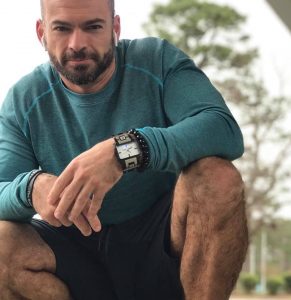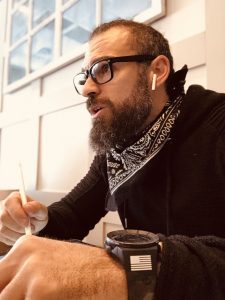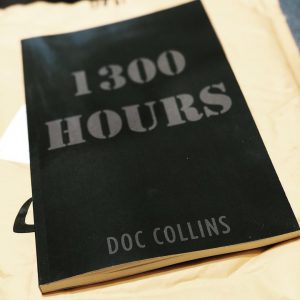By Wes O’Donnell
Managing Editor, InMilitary.com. Veteran U.S. Army & U.S. Air Force.
I engage daily with individuals who are exemplars of veterans’ achievement. In fact, while speaking with CEOs, celebrities, professional athletes and entrepreneurs over the past two years, I admit that I have become a little indifferent to inspirational high-achievers.
When one deals so often in the currency of inspiration, it can become almost routine.
Therefore, it was a pleasant surprise when I sat down recently with Army veteran, athlete and author of “1300 Hours” Doc Collins. During our interview, we discussed his book, his creative process and his advice for other veterans.
But perhaps the key takeaway for me was that I felt inspired again. And that is huge.
Our initial meeting was serendipitous. Typically, I get referred to veteran entrepreneurs through my good friend Eric Mitchell’s warrior-focused PR firm, LifeFlip Media. In Doc’s case, the mysterious Facebook algorithm connected us, likely because we move in and out of the same veteran social circles.
Shortly after our meeting, Doc sent me a copy of “1300 Hours” to read. And while a proper review of that book is pending, I wanted an interview with Doc to get his take on what success means to him and how other servicemembers can duplicate that success.

Wes O’Donnell: Doc, thank you so much for your time today. I have to tell you I’m about three-quarters through the book and I’m in awe at your writing style. It’s almost like you have been doing this your entire life. Can you start by telling us a little about your military background?
Doc Collins: Thanks, Wes. Very happy to be here. I did it a little backwards; I entered the U.S. Army after a career in sports entertainment, so I was often known as “the old guy.” My MOS [Military Occupational Specialty] was 68-Whiskey, Combat Medic Specialist. “Doc Collins” is the pen name that I use as an homage to my brothers and sisters who I cared for while I was on active duty.
Wes: Where were you stationed?
Doc: I was initially assigned to Fort Bliss and after four years, I reenlisted and went to Special Forces Assessment and Selection (SFAS). I broke two toes while I was there and decided not to go back. At that time, my personal life was disintegrating and I applied for a compassionate reassignment to the East Coast. The Army allowed a change of duty station from Fort Bliss to Fort Eustis.
While at Eustis, I served in pediatrics and I have to tell you, it felt really good to take care of our warriors’ dependents. I separated honorably in April of 2017.
Wes: Doc, I know a lot of active-duty men and women serving right now are going to be reading this, but I don’t think a lot of them are well prepared for that transition. Tell me about that transition for you. How hard was it?
Doc: It was tough. Like many, I moved away from my support structure and just floundered for a year. I moved to Pensacola, Florida, and took a writing job at a coastal magazine. I had a sales job in New York at a sports nutrition startup. Eventually, my father offered me the chance to stay with him rent-free while I finished the book.
Now I feel like I have passed that tipping point. A lot of good things are starting to happen.
Wes: For those transitioning servicemembers or veterans who have a story inside them that they want to share with the world, what’s your advice for an aspiring veteran author?

Doc: First, they need to identify their gift. We all have something to contribute to the world and the tragedy of the human condition is that some people take their gift with them to their grave.
The advantage that a veteran has is the ability to tap into and recreate that focus and discipline they had while they were in the service. If you can identify your gift, use your self-discipline from your military service and add appropriate accountability. Setting goals for yourself, there is only one way to go and that’s forward.
For instance, I give myself a 13-week windows to write. I make sure my goals are significant but attainable.
Wes: Clearly, your gift is writing. But I must admit that I was surprised when I read “1300 Hours” and came to realize that it was a romance novel. After all, you have a very intense presence and physicality. How did you land in that genre?
Doc: Actually, it started as an exercise suggested by a military family life counselor. At the time, I was having some pretty severe marital problems and the counselor asked me if I had a creative outlet for my romantic ideations. The words in my writings come from my authentic pain and experience.
Wes: Now it makes sense. While reading the novel, I felt a certain uncanny level of authenticity. I think that is what makes it so good.
Doc: I live and breathe these characters. I see myself as both main characters in the book. While writing recently, I was at a Starbucks sitting alone with my writing tools and there was an older man sitting close by. He must have been in his late 60s, well dressed, a lawyer type. He appeared to be meeting with a colleague of his and he stopped talking, looked over at me and said, “Young man, are you okay?”
I didn’t realize it at the time, but I had been emoting physically. I had tears in my eyes because I was working on my characters and the story.
I just replied, “Yes sir, I’m an author and my characters are going through a tough time right now, but everything will be okay.”
Wes: It sounds like you really have a deep connection to your characters. I have written a couple of nonfiction titles and I am always in awe of fiction writers and the world-building that you do. How do you think your work helps other veterans?
Doc: Part of this journey has been about building a bridge to my younger brother, a Marine veteran. He saw some things in Anbar Province, Iraq, that really changed him. His transition was painful and you could tell that he was in pain. My hope was to be a big brother that he could be proud of and perhaps he would open up and share some of his pain.
One night we got together and just talked for several hours. He told me about one of his guys, Corporal Aaron Seal, who was very young and killed in action. The fact that he opened up to me and shared his pain was really meaningful. I honor Corporal Aaron Seal in the story.
Wes: So what does success mean to you? Is it all about helping others?
Doc: If the book can help other veterans process their pain or, on the lighter side, help inspire them to do something creative, I consider it a success. It’s all about changing lives through sharing stories. I think we all have a responsibility to be good stewards of our gifts.
Wes: Doc, I have to ask…What book are you reading right now?
Doc: I’m currently reading “Deep Work” by Cal Newport. It’s all about rules for maintaining focus in our increasingly distracting world.
Wes: Doc, it was a pleasure speaking with you. You said some things that deeply resonate with me; I think every human is a prodigy at something. The issue is that no one explicitly tells us what that something is.
I think we all have a gift that, once discovered, needs to be nurtured and cared for so that the world may benefit from it. I’m glad you found yours and I’m looking forward to finishing the book and looking forward to the next!
Doc: Thanks, Wes, the pleasure was all mine. Let’s stay in touch.
Check out 1300 Hours on Amazon. It currently has 17 five-star reviews!


Comments are closed.